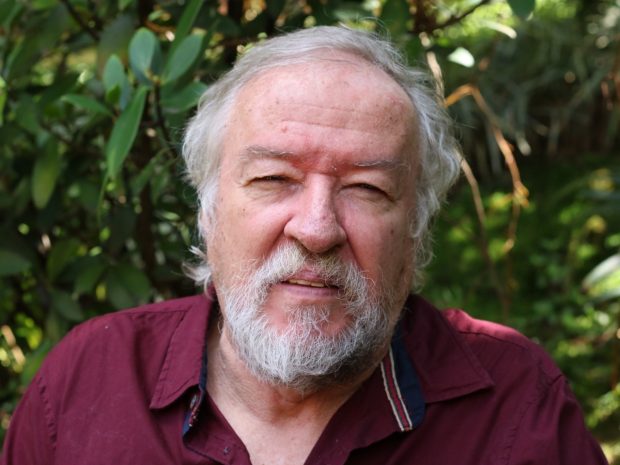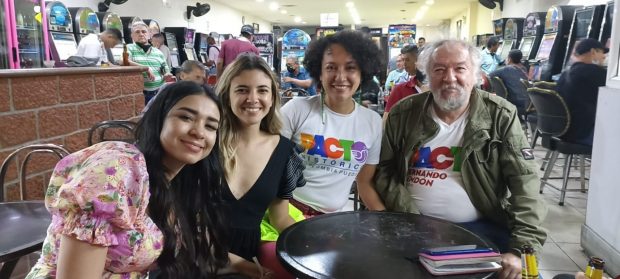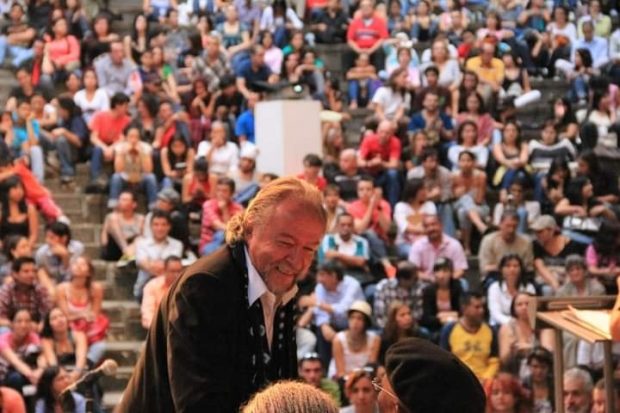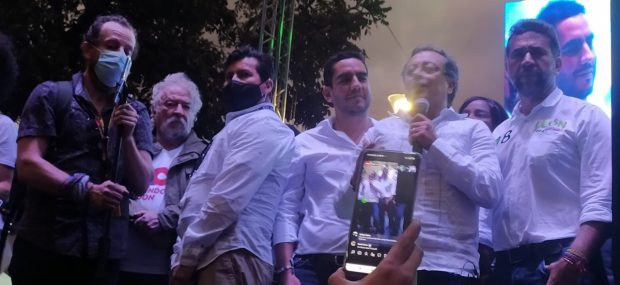
A Poet is born a Politician: Interview with Fernando Rendón

By ASHRAF ABOUL-YAZID
Asia Journalists Association President
CAIRO: I was about to interview the man who for more than three decades continued to sing for freedom, beauty and poetry, which made him an iconic poet of our time. This is Fernando Rendón; the renowned Colombian poet and founder and director of the International Poetry Festival of Medellín, for more than three decades, when I read his message that he had decided to resign as director of this worldwide poetic activity.
I believe that a poet is born a politician, spending his life defending certain morals, thoughts and ideals. So, what will be the next land of Fernando to defend?

Dear Fernando, after organizing 31 editions of the Festival, 25 versions of the Medellin Poetry School, 116 issues of Prometeo magazine, two editions of the World Summit for Peace in Colombia, obtaining the Alternative Nobel Prize in 2006, you decided to resign as Director of the Festival, why?
Colombia has lived through an intermittent civil war for more than two centuries, since the year of its independence, which has left many millions of victims. Such an extreme accumulation of violence, arising from an extreme accumulation of violence, which originates a state of generalized poverty, of course permanently closes the way to prosperity and happiness of the people. Poetry, which, of course, is not a sum of words, expresses the dream of freedom, justice and life that opposes war and death. I was invited to be a candidate for the Senate of the Republic by the Historical Pact, a coalition of political forces that seeks a profound change in Colombian society, to transcend the conflagration and build a profoundly democratic and popular government in this country. I could not refuse. Only in this way could I contribute to the partial fulfilment of the dream of poetry in everyone’s life.
You have said that your program is to build a poetic, democratic and life-transforming culture in Colombia by poets and artists, by philosophers and thinkers of your country, with the enriching contributions of poets from all continents. How do you imagine this to be accomplished?
I have heard opinions and proposals from poets and artists friends inside and outside the country. What we have all been seeing for a long time is a global offensive against culture: budgets for art are being eliminated and undermined, the media hide poetry and businessmen continue to make artistic creation a commodity, while trivializing culture and life, in the midst of a world that is unravelling in nuclear blackmail, wars for the appropriation of natural resources, the plundering of workers and land, and hopelessness.
This makes necessary the constitution of an alliance of poets, writers, artists and thinkers, to defend life on the planet, threatened in all its manifestations, highlighting the role of imagination and creation, as essential elements to help transform the world and life. In essence, the most serious problems of human beings are the same and can share in the same solution. However, all the changes that may take place in Colombia towards the materialization of a poetic and democratic culture, for the transformation of the life of the people, if the conditions for their realization are met, must be made from a popular government determined to support such a proposal.

After so many years of conflict, how will poetry stop the fire hidden beneath the surface?
Poetry alone cannot stop the extreme violence, nor can it solve by itself the underlying problems such as poverty, unhealthy conditions, lack of schools and universities, and other shortcomings of the population. Nevertheless, poetry is an inspirational force for change; poetry gives human beings back the meaning of life. And it can also help to create a spiritual atmosphere in a country that has lived for so many decades under the crossfire of hatred. In this sense, poetry is unique, as a profound spirit of change. And in time, assumed as its own by the Colombian people, it will be able to stop the fire hidden beneath the surface.
The International Poetry Festival of Medellin created a global spirit to be a guide for many festivals. Will this situation inspire social change outside Colombia?
The Festival inspired the creation of the World Poetry Movement and other international poetry festivals inside and outside Colombia. If poetry can be assimilated by the process of the Historical Pact in this country, and contribute to mobilize the population, developing bonds based on identity, on mutual solidarity, on trust in a future forged by a constant conscious popular struggle, with clear objectives and tasks, if Colombia can become the country it dreams of, and poetry is part of its dream, one day Colombia will radiate its deep spirit to the world and will be a paradigm of social change in the world.
Your name was a main support to the mission of the International Poetry Festival of Medellin. Do you think that your transfer could negatively affect its progress?
I think that my absence from the direction of the International Poetry Festival of Medellin is the result of a normal process. I had already been in the direction of this process for 31 years. The people who are part of the direction are capable men and women, with a great poetic sensibility, some of them with a visible work, and no doubt all of them are well trained to continue with the tasks of the Festival, whose next edition will be held in July 2022. For me it is an achievement to stop being necessary in the direction of the festival. And may things from now on be the same or better without me.

Global messages were sent to you, written by famous poets, how did you observe this change?
I have received many, many messages in video and text, from poets I value highly, among them Africans Nimrod and Ismael Diadié; Europeans Francis Combes, Marco Cinque, Tobias Burghardt, Ataol Behramoglu, Gerry Loose; Australian Les Wicks; Asians Sue Zhu, Aminur Raman, Vadim Terekhin, Rati Saxena; and Latin Americans Enrique Sanchez Hernani, William Alfaro, Nicolas Antonioli and Daniel Freidemberg, among others. I also received an affectionate message from Russian cosmonaut Alexander Lazutkin. Without exception, all of them were encouraging and strongly supported my decision. I feel accompanied and well interpreted, and I know that I can count on them for this task and others to come.
Culture is the foundation, the conscience and the memory of a nation. In a country of death and violent inequalities, a culture of life and for life is on the way to establishing a new era of peace and social justice. These are your words. You need a lot of support from the people, as you are up against the usual political forces, who used to win through their ways. How much you trust the voices of the people who continue to see in you a man of words and poems, not politics.
I trust in life completely. I know I have chosen a difficult path, full of risks. But which life is not subject to the law of uncertainty… The people need poetry. We must not refuse to give them what is theirs. Poetry underlies the lives of all. We must awaken the poetic genius of the people. We must be present. Life does not wait.
The dream of a poet was to achieve a cultural world of free justice, what is your future dream?
I dream that it will be possible to poeticize human history, and that sooner or later poets will come out of the margins of society and will trust more than ever that their words will be heard and weighed with justice by all human beings. I dream that poetry will be in the mouths and ears of all, that it will be the language in which we will all communicate. I dream in the victory of life, in the triumph of poetry expressed in the unity of the peoples of the world to govern their destiny.


